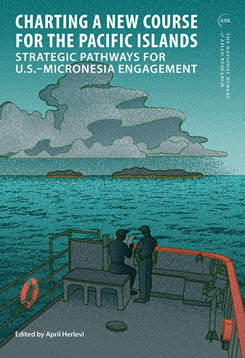Essay from NBR Special Report no. 104
Security in Micronesia: Navigating a Violent Geography
This essay examines the security landscape in the subregion of Oceania known as Micronesia, assesses the equally existential human security threats from climate change and traditional geopolitical security threats, and provides guidance for U.S. policymakers to better understand islander perspectives on the future of regional security.
EXECUTIVE SUMMARY
MAIN ARGUMENT
In an age of escalating great-power tensions, Micronesia has emerged as a strategically located geopolitical hotspot. The islands simultaneously face existential threats from climate change and rising geopolitical security tensions. Prioritizing one of these threats over the other is not feasible and will lead to a blind spot for regional policymakers. Furthermore, there are structural factors that inhibit just and equitable engagement between the U.S. and Micronesia, including the hierarchical political order that exists in the region. Only by understanding the region’s role in a potential future conflict can policymakers in the U.S. and the region develop more mutually beneficial policies.
POLICY IMPLICATIONS
- The convergence of climate change, intensifying human security issues, and traditional geopolitical security concerns will define the future of Micronesia. Any U.S. policy toward the region that ignores this convergence is doomed to be incomplete at best or a failure at worst.
- The U.S. has political relationships in Micronesia that are hierarchical and colonial. Moving forward, the U.S. needs to address and resolve these issues if it wants to more fully engage with the Pacific Islands.
- U.S. miscalculation in any conflict with China will affect Micronesia existentially. Policymakers in the region need to consider this risk when engaging with the U.S. or China.
- The U.S. needs to continuously engage the islands and their inhabitants when deliberating on policy issues that will affect Micronesia.
Kenneth Gofigan Kuper is an Assistant Professor of Political Science, CHamoru Studies, and Micronesian Studies at the University of Guam. He is also Director of the Pacific Center for Island Security and a board member of Guam’s Commission on Decolonization.


